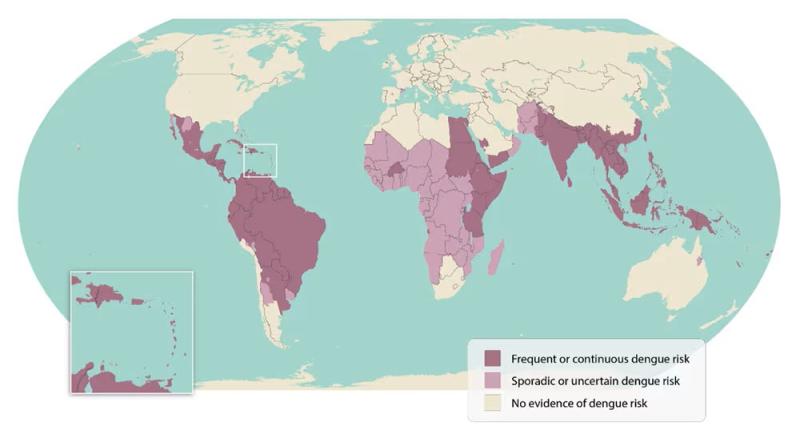Dengue is an illness that is caused by infection with a dengue virus. It spreads to people from mosquito bites. It is common in many tropical and sub-tropical countries in the Americas, Africa, the Middle East, Asia, and the Pacific Islands. Up to 400 million people are infected by a dengue virus each year.
Many countries are reporting a higher number cases of dengue, including a record-breaking numbers of cases in many countries in the Americas, including Caribbean countries. The Centers for Disease Control and Prevention (CDC) recently shared an alert with healthcare providers and the public about an increased risk of dengue virus infections in travelers returning from places where dengue spreads.
Most dengue cases reported in the United States (in states other than Hawaii) are in travelers who were infected elsewhere. People also can catch the virus in U.S. territories (American Samoa, Puerto Rico, and the U.S. Virgin Islands) and freely associated states (Federated States of Micronesia, the Republic of Marshall Islands, and the Republic of Palau), where dengue is common. Limited spread has been reported in Florida, Hawaii, Texas, Arizona, and California.

Symptoms of dengue usually begin within 2 weeks after being bitten by an infected mosquito. The most common symptom is fever with aches and pains (eye pain, muscle, joint, or bone pain), nausea, vomiting, and rash. Sometimes severe dengue can develop and result in shock (seriously low blood pressure), internal bleeding, organ failure, and death. Seek medical care if you have a fever or other dengue symptoms and live in or have traveled to an area with dengue outbreaks.
Anyone who lives in or travels to an area with dengue is at risk for infection. There are ways you can prevent dengue.
- Before you travel, find country-specific travel information. This can help you understand health risks at your destination so you can plan ahead and pack the right clothing and gear to help you stay healthy and safe.
- The best way to prevent dengue is to avoid mosquito bites. If you plan to travel to an area with frequent or continuous dengue transmission, protect yourself from mosquito bites during and after your trip.
- Use EPA-registered repellents.
- Wear loose-fitting, long-sleeved pants and shirts.
- Stay in places with air conditioning and with window/door screens or bed nets.
- A dengue vaccine is approved for children aged 9–16 years with laboratory-confirmed previous dengue virus infection AND who live in areas where dengue is common. The vaccine is not approved for use in U.S. travelers who are visiting places where dengue is common.
Additional information
- Learn more about Dengue
- Find Travel Health Notices
- Increased Risk of Dengue Virus Infections in the United States
- See more ways to Fight the Bite
- Follow the Health Department for more updates about viruses and other health topics

